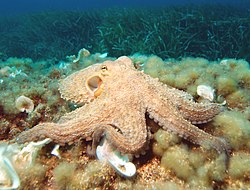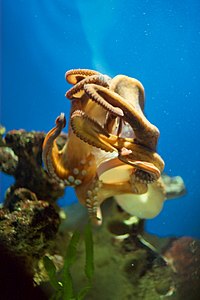An Octopus Can Fit Through Anything Larger Than Its What
| Octopus | |
|---|---|
 | |
| Octopus vulgaris, the common octopus | |
| Scientific classification | |
| Kingdom: | Animalia |
| Phylum: | Mollusca |
| Class: | Cephalopoda |
| Subclass: | Coleoidea |
| Superorder: | Octopodiformes |
| Order: | Octopoda |
| Suborder: | Incirrina |
| Family: | Octopodidae |
| Genus: | Octopus |

Octopus [1] is a genus of cephalopod mollusc in the order Octopoda. The genus is quite typical of most octopods. They have two, large eyes and eight limbs with suckers. They have a hard beak, with the oral cavity at the eye point of the arms.
Octopods take no internal or external skeleton, allowing them to squeeze through tight places. Many stay in cracks between rocks or corals when they are not hunting. They are intelligent predators with a taste for crabs.
Octopods inhabit many regions of the body of water, especially coral reefs. For defense confronting predators, they hide, flee quickly, miscarry ink, or apply colour-changing cover-up. They live rather short lives.
An octopus trails its eight arms backside it as it swims. All octopods are venomous, but just the small blueish-ringed octopus is known to exist mortiferous to humans.[2]
There are about 300 octopod species, of which more than 100 are in the genus Octopus. Octopods brand up over one-third of the full number of living cephalopods. The term 'octopus' may be used to refer to those in the genus Octopus. The term 'octopod' is correct for members of the order Octopoda in full general.
Anatomy [change | modify source]
Different almost other cephalopods, most octopods accept merely soft body with no internal skeleton. They take no protective outer shell like the nautilus, which is another blazon of cephalopod. A neb, similar in shape to a parrot's beak, is their simply hard part.
Because of this, it is very like shooting fish in a barrel for an octopus to squeeze through very narrow openings between rocks, for example squeezing through a hole as large every bit its center.
Eyes [modify | modify source]
Octopod eyes are complex. In fact, they do not accept a blind spot.[3] A blind spot is a special place in the eyes that is not able to sense lite. So, when we look somewhere, part of what is there is not really perceived (the brain 'fills in' and so we exercise non notice). However, an octopus does not have this trouble.
The lens in octopod are movable. Information technology moves back and along to focus. This is the way a camera focuses. When a photographic camera focuses on an object to take a moving-picture show, the lens moves back and forth until the image that the camera sees is in the right focus.[3]
Colours [change | change source]
Some octopuses can use their chromatophores for more camouflage. If they are not blending in with their surroundings, they tin signal their feelings using colour. When they are relaxed, for case, they are a dull, grayish brownish or orange-tinged colour. When they become angry, they tin become crimson. If they feel scared, they may turn white.
Behaviour [change | change source]
Intelligence [modify | modify source]

An octopus opening a container with a screw cap
Octopods are highly intelligent, probably more than so than any other invertebrate. The exact extent of their intelligence and learning capability is much debated amongst biologists.[4] [5] [6] Maze and problem-solving experiments have shown that they do have both short and long-term memory. Their brusque lifespans limit the amount they can learn.
Some octopods, such equally the mimic octopus, can move their arms in ways which re-create the movements of other sea creatures.
In laboratory experiments, octopuses can be readily trained to distinguish between different shapes and patterns. They have been seen in what some have described as play: repeatedly releasing bottles or toys into a circular current in their aquariums then communicable them.[7] Octopuses oftentimes suspension out of their aquaria and sometimes into others in search of nutrient.
The largest of the 300+ species of octopods, the giant octopus Enteroctopus, is large indeed. Mature males average about fifty pounds and females virtually 33 pounds. Their arm spans are about eight feet. They have fifty-fifty boarded fishing boats and opened holds to arrive and eat crabs.[5]
In the United kingdom, cephalopods such as octopuses are regarded every bit honorary vertebrates nether the Animals (Scientific Procedures) Act 1986. This gives them protection not normally given to invertebrates.[8]
Octopods are the simply invertebrate which take been definitely shown to utilize tools. At to the lowest degree four specimens of the veined octopus (Amphioctopus marginatus) have been seen picking up discarded coconut shells, and and then reassembling them to employ every bit shelter.[ix] [ten]
Octopods are active and intelligent predators, with skilful eyesight and brains. They swallow generally crabs and some fish.
Defences [change | modify source]
Octopods have a multifariousness of defences. They use agile camouflage and mimicry, controlled by their nervous system. Most can eject blackness ink clouds to help escape, and some can shed an arm in farthermost danger. It wriggles, and attracts the attacker.
Reproduction and death [change | change source]
When octopods reproduce, males use a specialized arm to put packets of sperm into the female's mantle cavity. Males dice within a few months of mating. In some species, the female octopus tin can go on the sperm alive inside her for weeks until her eggs are mature.
Later they have been fertilized, the female person lays about 200,000 eggs (this figure dramatically varies betwixt species). The female cares for the eggs, guarding them against predators, and gently blows currents of water over them so they go enough oxygen. The female does not hunt during the one-month period spent taking care of the unhatched eggs, and may ingest some of her own arms for sustenance.
At effectually the time the eggs hatch, the mother leaves the lair and is also weak to defend herself from predators like cod, often succumbing to their attacks. The young larval octopuses spend a menses of fourth dimension globe-trotting in clouds of plankton, where they feed until they are ready to descend to the ocean bottom, where the cycle repeats.
All octopods for which we accept information have a relatively short life expectancy. Some species live for as footling as six months. Larger species, such as the Due north Pacific giant octopus, may live for up to five years under suitable circumstances.
Reproduction is a crusade of death: males can only live for a few months after mating, and females die before long subsequently their eggs hatch. They neglect to eat during the (roughly) one-month period spent taking care of their unhatched eggs, but patently they do non die of starvation. A biological explanation of these short lifespans (or rapid ageing) is not agreed at present.


Left: Vase from a Mycenaean Greek cemetery at Prosymna, Argos, about 1500 BC
Right: Ancient Greek blackness-effigy amphora (vase), 530–520 BC. On the left, a hoplite with an octopus image on his shield. Staatliche Antikensammlungen, Munich, Germany
Deep-sea octopod broods eggs [change | change source]
Off the coast of California, marine biologists have watched the aforementioned female octopod guarding her eggs for over four years. Their evolution took a long time because the water i.four kilometres downwards was very common cold. They knew it was the same octopod considering it had a characteristic scar. The research was done using a remote diving vehicle with cameras, lights and robotic arms.[11] [12]
References [change | change source]
| | Wikimedia Commons has media related to Octopus . |
- ↑ The plural of Octopus is usually octopuses. For members of the guild Octopoda in general, 'octopods' is the term used. (Greek: okto = eight; podes = feet).
- ↑ Unimelb.edu.au Archived 2011-10-06 at the Wayback Machine Tentacles of venom: new study reveals all octopuses are venomous, Academy of Melbourne, Media Release, Wed 15 Apr 2009
- ↑ 3.0 3.ane Marion Nixon & J.Z. Immature 2003. The brains and lives of cephalopods. New York: Oxford Academy Press. ISBN 0-19-852761-half-dozen
- ↑ NFW.org? Archived 2009-12-15 at the Wayback Machine, Is the octopus really the invertebrate intellect of the sea? Doug Stewart, in National Wild fauna February/Mar 1997, 35, #2.
- ↑ five.0 5.1 "Adopt a Giant Octopus - National Zoo- FONZ". web.annal.org. two January 2008.
- ↑ Slate.com, How smart is the Octopus?
- ↑ What behavior can we look of octopuses? by Jennifer Mather and Roland C. Anderson.
- ↑ "United kingdom Animals (Scientific Procedures) act of 1986". Archived from the original on 2009-04-19. Retrieved 2010-09-01 .
- ↑ "Octopus snatches coconut and runs". BBC News. 2009-12-14. Retrieved 2010-05-xx .
- ↑ "Archived copy". Archived from the original on 2013-10-24. Retrieved 2010-09-01 .
{{cite spider web}}: CS1 maint: archived copy as championship (link) - ↑ Webb, Jonathan 2014. Broody octopus keeps tape-breaking iv-year vigil. BBC News Science & Technology. [1]
- ↑ Robinson ; Seibel B & Drazen J. 2014. Deep-sea octopus (Graneledone boreopapacifica) conducts the longest egg-brooding period of any animal. PLoS One DOI: 10.1371/journal.pone.0103437 [2]
Source: https://simple.wikipedia.org/wiki/Octopus
0 Response to "An Octopus Can Fit Through Anything Larger Than Its What"
Postar um comentário